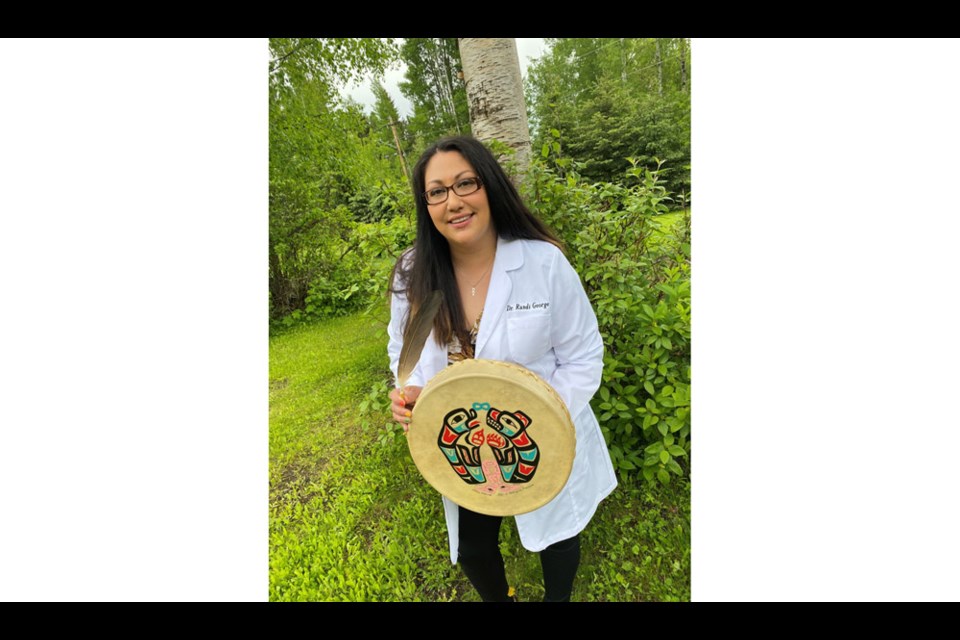Fuelled by her cousin's suicide, Randi George, a recent graduate of the Northern Medical Program, will soon take her psychiatry residency in the Vancouver Fraser Medical Program so she can get the experience she needs to return to Prince George to help Indigenous people heal from their trauma.
George grew up in Hagwilget Village within the Hazeltons in the north and was just four years old when Tammy Potskin, her beloved cousin who felt more like a big sister, took her own life when she was 18 years old.
That very personal loss affected not only George but her family and community as well. It resonates so strongly with George to this day that she carries her cousin's high school ID card with her as a reminder of why she needs to move forward on her educational journey so she can soon help heal others whose health has been impacted by painful history.
"Tammy spent summers with us and spent her last Christmas with us," George said. "I have a picture of us - me at four years old and I'm looking up at her - it's my last picture with her - she took her life just a few months before she graduated high school and that changed all of us."
Because George was so young when her cousin committed suicide, she didn't know exactly what she was going to do but she knew she had to do something.
"It changed my course in life - I always promised that I wouldn't let her death be in vain," George said. "I wouldn't forget her life, I wouldn't forget her love and somehow I would do something about it."
To think she would ever go into medicine was beyond her comprehension.
"I was a little Indigenous girl from a reserve where a lot of people didn't graduate high school let alone go to university or medical school," George said. "I didn't even see or hear about an Indigenous doctor, so it's not something that was in my mind at the time - I just knew I didn't want Tammy's loss to be forgotten."
George was at UNBC in her third year, working on her bachelor of science degree when she started to panic because she didn't know where she was going with it.
"I realized I didn't like lab work and I didn't like field work," George said.
She felt stuck and turned to career counselors, friends and then when she turned to family that's when she got the revelation of her life.
"I was talking to my Auntie Tina (Morin), telling her I didn't know what to do or what my next step would be - 'what am I going to be? I want to help people but I don't know what that looks like' and that's when she said 'why don't you be a doctor?' I started laughing because I thought she was kidding," George said. "She just gave me a strange look and said 'why are you laughing?' and I said 'you're kidding, right? I can't be a doctor,' and she said 'why can't you be a doctor? You're in university, you're a straight A student - why couldn't you be a doctor?'"
And that's when George knew she found her path.
She did volunteer work at the hospital and she worked at the Central Interior Native Health Clinic in downtown Prince George as a medical office assistant just to make sure she wanted to work in the medical field.
"Working with the Indigenous and disadvantaged population downtown, working with an interdisciplinary team with culturally safe, trauma safe care I really got to see what type of medicine and what area I wanted to work in and I realized yes, I could be a doctor, yes, I could focus on medicine but I should also focus on education and advocacy when it comes to issues faced by my people," George said.
That's when she started her medical training in Prince George.
Working on the frontlines at the Central Interior Native Health Clinic changed her, George said. It shaped how she would approach medicine and the path she would take.
"My time working with the staff and patients at Central Interior Native Health is something I will carry with me forever," George said.
The first time George knew her family was instrumental in starting the downtown clinic was when she received her welcome package after she was hired and read about the founders, Dan George and Harold Morin, who are her uncles, one from each side of her family. Founding board members were also in her family tree, including Lillian George and Teresa George.
"It was a really cool, full circle moment that I ended up working there and that ultimately sent me into medicine," George said. "I'm hoping when I'm done I can end up working at the clinic again. It's so close to my heart."
George is one of 34 UBC Northern Medical Program students celebrated during the 13th graduation of the program. The ceremony took place virtually on June 17. Graduates will move into medical residency and fellowship training for two to seven years, depending on their specialty. Graduates are exploring specialties including anesthesiology, dermatology, diagnostic radiology, family medicine, general surgery, internal medicine, obstetrics and gynecology, pediatrics, physical medicine and rehabilitation, psychiatry and plastic surgery.
Fifteen graduates are entering family medicine residency programs, with most training in rural and smaller centres in B.C. and across the country. Three graduates will train in Northern B.C.
The Northern Medical Program at UNBC is part of the Faculty of Medicine at the University of British Columbia.



